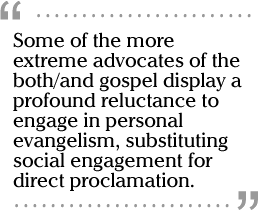The Necessity of Personal Separation in Biblical Fundamentalism
Editor’s Note: This article accompanies FBFI Resolution 09-05 and is reprinted with permission from the May/June issue of FrontLine magazine.
As iron sharpens iron,
one person sharpens another. (Proverbs 27:17)
Editor’s Note: This article accompanies FBFI Resolution 09-05 and is reprinted with permission from the May/June issue of FrontLine magazine.
Editor’s Note: This article accompanies FBFI Resolution 09-04 and is reprinted with permission from the May/June issue of FrontLine magazine.
Editor’s Note: This article accompanies FBFI Resolution 09-03 and is reprinted with permission from the May/June issue of FrontLine magazine.
 Introduction
IntroductionPastor Robert Corso is facing a hard decision. Another Bible-believing pastor in his town has asked him to participate in a joint youth outreach emphasis. The difficulty is that Pastor Corso has some significant differences with the other church in terms of ministry philosophy and the practice of youth ministry. Although he does not wish to throw stones, he does not feel comfortable participating in the event. Pastor Corso is sure that some of his church members believe that he should publicly separate from the other church. Other members would see nothing wrong with participating, given that the gospel is more important than a church’s “parochial interests.”
Although there are times when a church must unequivocally separate itself from individuals and ministries, many times a pastor is faced with a situation like the one above. He does not believe that he has clear enough Scriptural warrant to publicly declare another ministry or minister to be “in sin,” but he does not think it prudent to involve himself too closely with that ministry or a particular project. The question is whether he has the leeway to limit his participation without officially separating from the other ministry. Are there such things as prudential limits on association that are different in nature from Biblical separation?
Editor’s Note: This article accompanies FBFI Resolution 09-02 and is reprinted with permission from the May/June 2009 issue of FrontLine magazine.
 One criticism leveled against Fundamentalists is their refusal to engage the culture. Sociologist Alan Wolfe writes, “When believers refuse to engage the culture, their opponents dismiss them as fanatics, frustrated people rendered insecure by the dilemmas and opportunities of modernity.” 1 Implicit in this complaint is resentment toward Fundamentalists for being unsociable: they are generally an intolerant people who do not mix well with their culture. Interestingly, this same complaint was directed against first-century believers by Roman hedonists.
One criticism leveled against Fundamentalists is their refusal to engage the culture. Sociologist Alan Wolfe writes, “When believers refuse to engage the culture, their opponents dismiss them as fanatics, frustrated people rendered insecure by the dilemmas and opportunities of modernity.” 1 Implicit in this complaint is resentment toward Fundamentalists for being unsociable: they are generally an intolerant people who do not mix well with their culture. Interestingly, this same complaint was directed against first-century believers by Roman hedonists.
It is true that historically Fundamentalists have refused to tolerate, let alone participate in behavior that exalts sensual pleasure and denigrates Christian values. The criticism is perennial, and understandably so, since sincere Christians have taken seriously the Biblical admonition to love not the world, neither the things that are in the world. They love and are loved by God, whose values are theirs and whose commands they seek to obey. And those living for the world have hated them for it.
 Editor’s Note: This article accompanies FBFI Resolution 09-01.
Editor’s Note: This article accompanies FBFI Resolution 09-01.
The word evangel means gospel. Therefore, to be evangelical is to be defined by the gospel. At minimum, those who claim to be Evangelicals should have a very clear idea of what the gospel is.
Within today’s Evangelicalism, however, the content of the gospel is the subject of significant disagreement. Many contemporary Evangelicals are attempting to create an understanding of the gospel that is much more inclusive than the message of personal salvation. While these Evangelicals do not always deny a personal gospel (and some are fervently committed to it), they think that the gospel must also deal with other issues, including problems of a psychological, social, and environmental nature. What they proclaim is neither simply a personal gospel nor a social gospel. It is a both/and gospel.
The basic argument for the both/and gospel is that sin has done more than to disrupt our personal relationship with God. It has disrupted the inner integrity of each individual, resulting in the disintegration of emotional wholeness. It has disrupted the relationship between humans, resulting in oppression and exploitation. It has disrupted our relationship to the created order, resulting in the ruination of nature through human abuse. According to proponents of the both/and gospel, a meaningful gospel must address each of these issues directly.
Discussion